From 2022 to 2024, VWB implemented the Agriculture-based Growth and Resilience Opportunities for Women (AGROW) program in Cambodia’s Battambang Province. Funded by Global Affairs Canada and delivered in collaboration with local partners, the program empowered women farmers, strengthened community food systems, and promoted sustainable livelihoods through a One Health lens. This report highlights the program’s key achievements—advancing climate-resilient agriculture, improving animal and human health, and elevating women’s leadership across rural communities.
I. Context
Nearly 80% of Cambodians live in rural areas and depend on agriculture, fisheries, and forestry for their livelihoods. Yet for many, farming remains precarious—challenged by low productivity, erratic rainfall, declining soil fertility, and limited access to markets and resources. As a result, food insecurity is widespread, with nearly 15% of the population classified as severely food insecure.
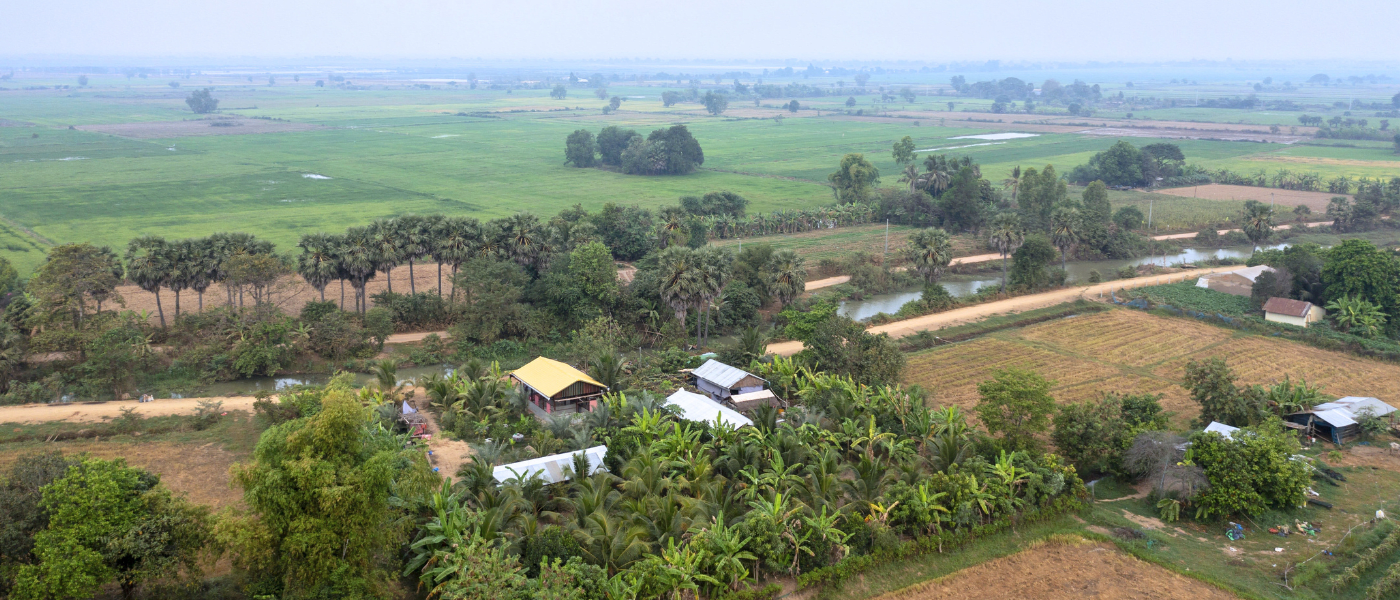 PHOTO: The rural countryside of Cambodia's Battambang province, where AGROW supported 21,360 individuals (59% women) in 48 villages across 3 districts.
PHOTO: The rural countryside of Cambodia's Battambang province, where AGROW supported 21,360 individuals (59% women) in 48 villages across 3 districts.
Women are the backbone of Cambodia’s agricultural economy, yet they face significant structural barriers. Most lack legal land ownership, access to credit, or representation in leadership and training opportunities. Gendered norms often restrict their participation in decision-making and confine them to low-paying, informal agricultural roles.
At the same time, economic migration to Thailand—particularly among young adults—has fractured rural families. Many women are left behind to shoulder household and farming responsibilities alone, while others migrate themselves, often at the expense of family cohesion and stability.
The AGROW program was designed to respond to these intersecting challenges. By placing women at the forefront of climate-smart agriculture and One Health training, it promoted a holistic model of development that improved food security, enhanced livelihoods, and strengthened the resilience of both people and ecosystems. Through integrated support for human, animal, and environmental health, AGROW aimed to build sustainable change—led by women and grounded in community.
II. Program Activities & Achievements
Over three years, AGROW reached 21,360 individuals across 48 villages—59% of them women—exceeding its original target fivefold. The program’s impact is reflected across four core areas:
1. Empowering Women in Agriculture
- 48 women-led groups launched, engaging 912 women in leadership and enterprise.
- 16,201 people trained in gender equity, sustainable farming, and cooperative management.
- Microgrants supported women-led agribusinesses and local food economies.
- Gender gaps in cooperative leadership were addressed to support long-term inclusion.
“Now, I grow a wider variety of vegetables and can sell more at the market.”
~ Ms. Ton Sothy, 42-year-old widow and mother of three, Banan District
2. Enhancing Livestock & Crop Production
- Incomes from chicken and cricket farming rose by over 300%.
- Egg production quadrupled; cricket harvests increased from 24 to 84 kg.
- Vegetable yields more than doubled using climate-smart techniques.
- 46 calves were born through Cow Bank and AI services.
“The income from selling eggs and chickens has made a big difference for our family.”
~ Ms. Thary Mork, farmer and mother, Aek Phnom District
3. Strengthening Animal Health & One Health Systems
- 185 people trained in animal care, including 48 VAHWs and 137 extension officers (63% women).
- 42,256 livestock vaccinated, dewormed, or treated.
- 12 One Health Demonstration Sites promoted integrated, eco-friendly practices.
- Community Health Days raised awareness on hygiene, nutrition, and zoonoses.
“We harvested 120 kg of pesticide-free vegetables—and now my husband helps with cooking.”
~ Ms. Ho Penh, mother of nine, Banan District
4. Building Resilience & Local Leadership
- 75% of farmers adopted more sustainable practices.
- 82% reported increased income, with women seeing the largest gains.
- Resilience scores tripled—from 5.5 to 17.4.
- Many graduates became peer mentors and demonstration farmers.
“Now I can support my child’s education. Without AGROW, I’d still be a labourer.”
~ Ms. Kimsiek Sokea, first-time cricket farmer, Banan District
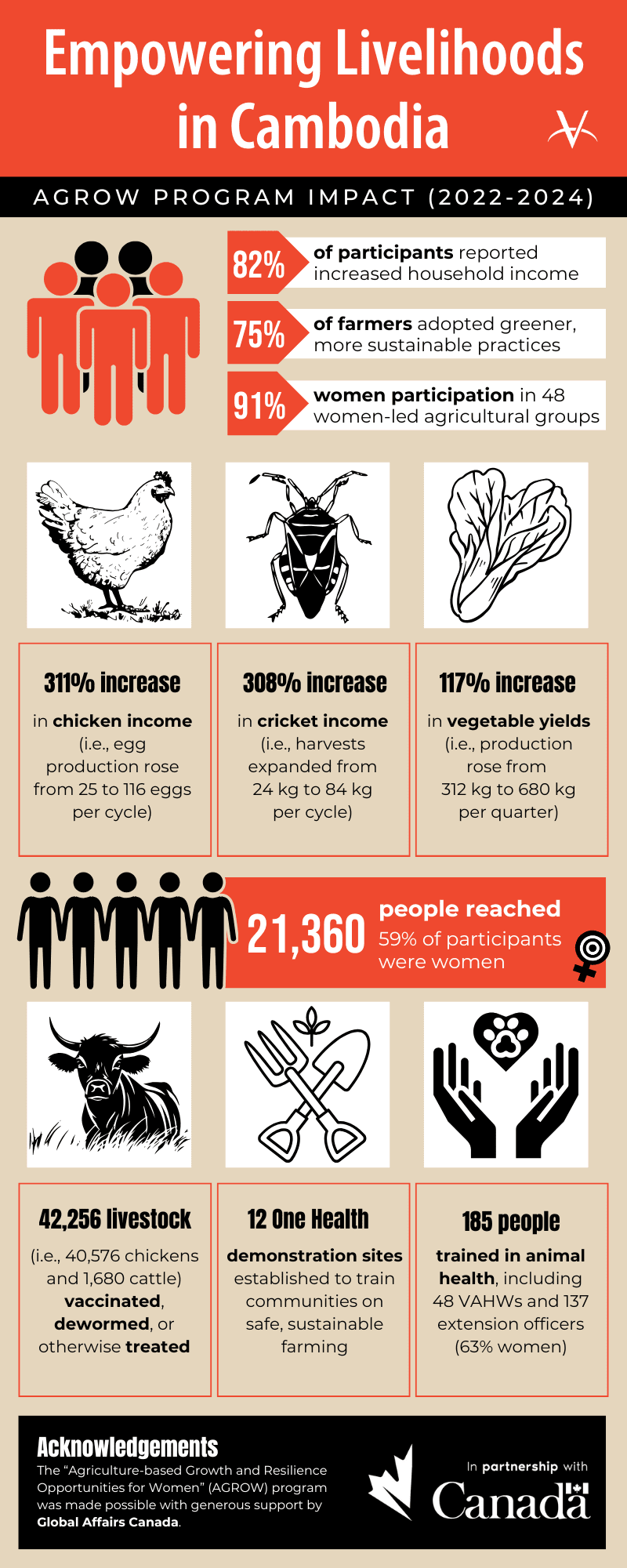 🔗 Download / enlarge the AGROW infographic.
🔗 Download / enlarge the AGROW infographic.
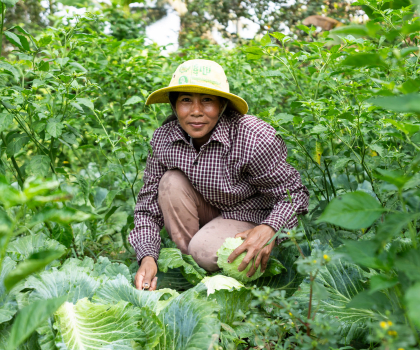 PHOTO: Ms. Ton Sothy, Banan District
PHOTO: Ms. Ton Sothy, Banan District
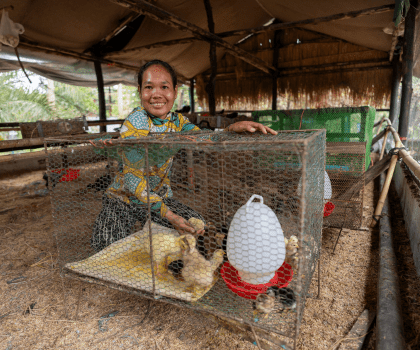 PHOTO: Ms. Thary Mork, Aek Phnom District.
PHOTO: Ms. Thary Mork, Aek Phnom District.
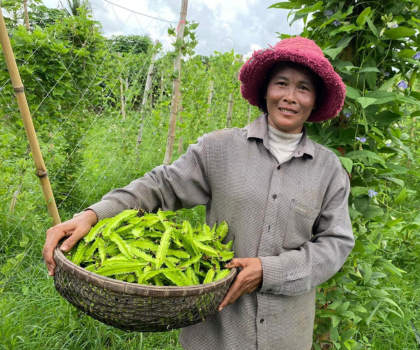 PHOTO: Ms. Ho Penh, Banan District.
PHOTO: Ms. Ho Penh, Banan District.
III. Stories of Impact
AGROW’s legacy lives in the women who turned opportunity into transformation. Two families, in particular, reflect the program’s depth—from returning migrants to local champions of change.
San Davy: From Migrant Worker to Multi-Enterprise Farmer
In Baydamram Village, Banan District, San Davy, a 34-year-old mother of two, once relied on seasonal migration to Thailand’s garment industry to help support her family. The work was physically demanding and kept her far from her children and elderly parents. After the birth of her second child, she returned to Cambodia and started a laundry business, but the income was inconsistent and barely covered household expenses.
Through AGROW, Davy received hands-on training in climate-smart agriculture, poultry and cricket production, and organic composting. She was provided with starter seeds, a cricket basin, and guidance on pest management and soil enrichment. With support from local extension officers, she began rotating crops, using natural fertilizers, and integrating insect farming into her routine—all on a small homestead plot.
Her diversified farm now includes vegetables like Chinese spinach, garlic, and lemongrass, as well as banana and papaya trees. Her crickets yield up to 35 kg per cycle, and she reinvested her earnings to build a chicken coop and purchase a motorbike for water transport. This combination of activities has improved her family’s food security and allowed her to cover school fees and household needs.
Today, Davy mentors other women in her village, sharing techniques in composting, pest control, and income diversification. “Because of farming, I can stay near my children and care for them myself,” she says. Her story is one of resilience, showing how sustainable farming can transform not only livelihoods—but entire futures.
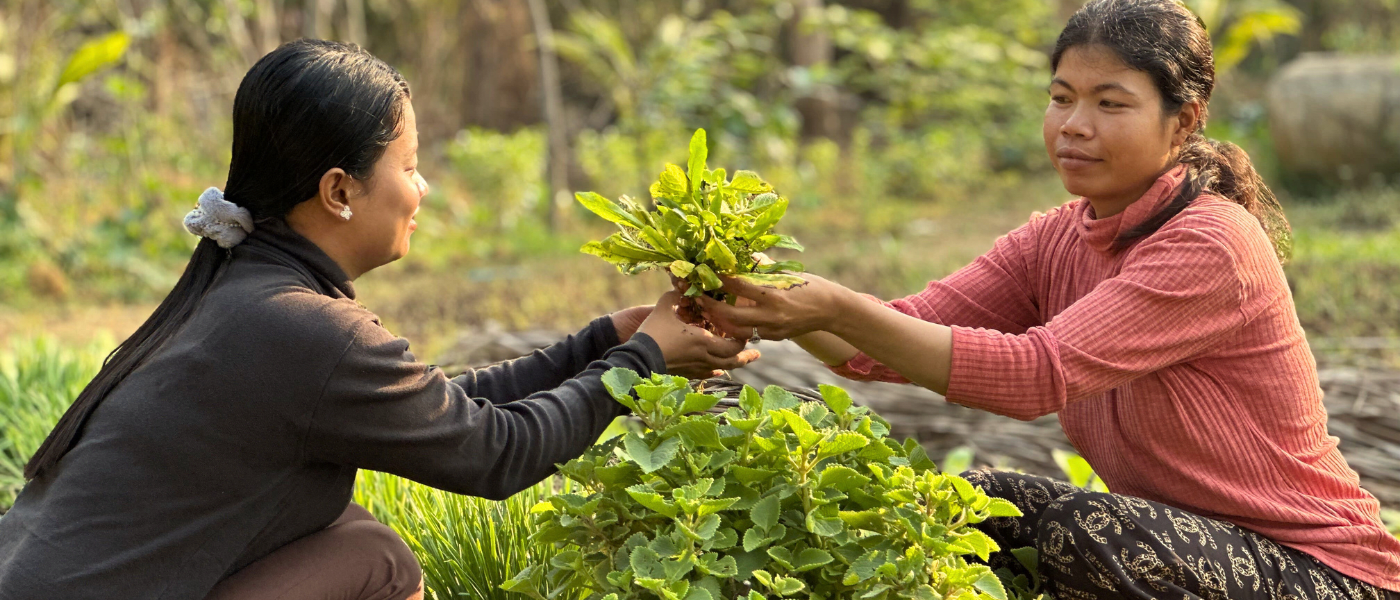 PHOTO: San Davy (right) sharing plants and natural agricultural techniques with a neighbor in her village.
PHOTO: San Davy (right) sharing plants and natural agricultural techniques with a neighbor in her village.
Yoeurn & Chhaem: From Migrant Labor to One Health Leaders
In Aek Phnom District, Yoeurn Yorn and her husband Chhaem Chhoeurn once relied on seasonal migration to Thailand to earn a living, leaving their children behind for most of the year. Their small family farm back in Cambodia remained underdeveloped—low crop yields, poor animal health, and limited knowledge of sustainable practices kept them from building a stable life at home.
Through AGROW, they received training in climate-smart agriculture, livestock care, and integrated pest and soil management. They built a net house nursery to protect young crops from heat and insects, began producing organic fertilizer from animal waste, and joined the Cow Bank initiative to introduce dairy and meat production. They also adopted biosecure poultry housing and diversified their crops with leafy greens and root vegetables.
With more productive land and healthier animals, they now grow food year-round and generate consistent income. Their farm has become a certified One Health Demonstration Site—highlighting sustainable practices that link human, animal, and environmental health. The increased income means the family can remain together in Cambodia, with their children in school and their household more secure.
Yoeurn and Chhaem have since trained over 100 families in their community, sharing knowledge on composting, water conservation, and livestock management. “Our animals are healthier, and we can now stay together as a family,” says Yoeurn. Their story shows how integrated support and practical training can transform a struggling farm into a thriving hub for resilience and learning.
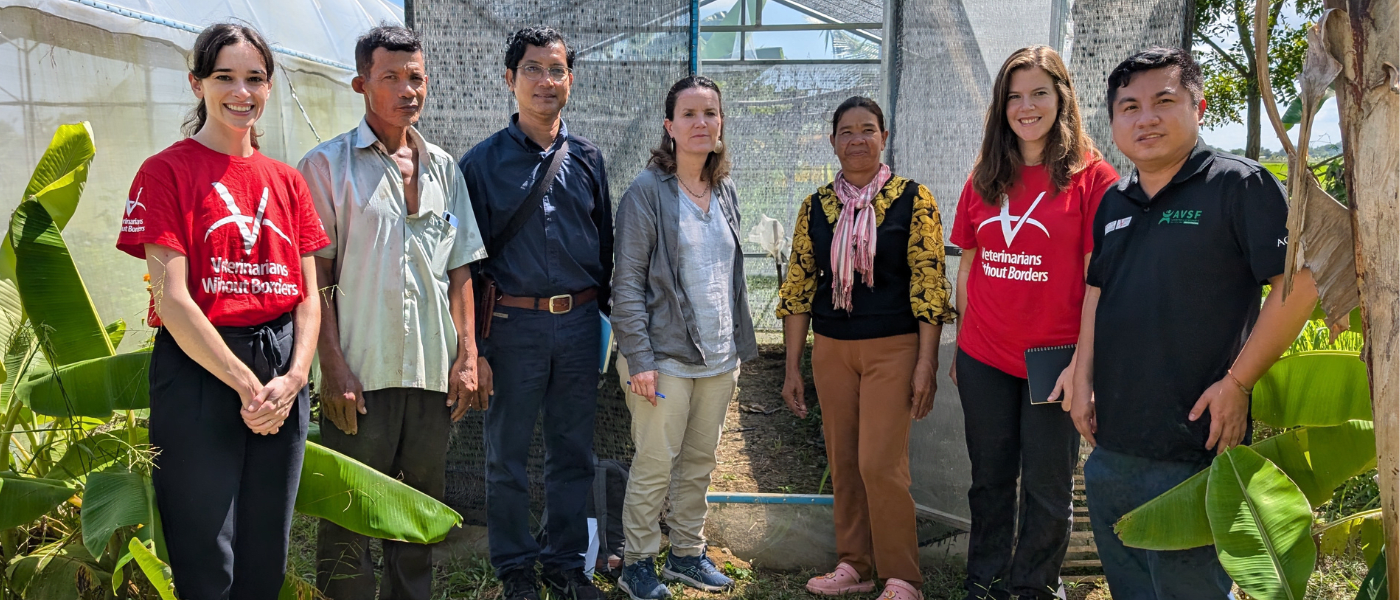 PHOTO: VWB’s program staff meet with Yoeurn (3rd from right) and Chhaem (2nd from left)—local farmers turned One Health champions—alongside our partners at AVSF Cambodia.
PHOTO: VWB’s program staff meet with Yoeurn (3rd from right) and Chhaem (2nd from left)—local farmers turned One Health champions—alongside our partners at AVSF Cambodia.
IV. A Lasting Legacy
AGROW wasn’t just a program—it was a movement toward a more equitable, sustainable future. It helped rural women gain access to resources, grow income-generating enterprises, and build climate resilience from the ground up. Its holistic One Health approach connected animal care, environmental conservation, and human health—supporting eco-friendly farming, improving sanitation, and reducing harmful inputs like chemical fertilizers.
The program also generated valuable lessons: that innovation in climate-resilient agriculture is essential, that community participation and women’s leadership are non-negotiable, and that adaptability is key in the face of climate and economic uncertainty.
Although AGROW concluded in 2024, its lessons, leaders, and demonstration farms continue to shape the agricultural landscape of Battambang Province.
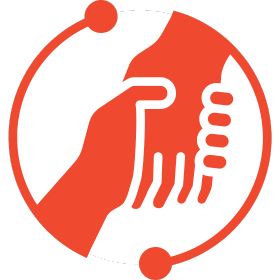 Join us in building climate-resilient communities and advancing women’s leadership in agriculture. Equal access to resources strengthens families, food systems, and futures. Donate, volunteer, or subscribe to support programs that create lasting change through sustainable farming, animal health, and One Health solutions.
Join us in building climate-resilient communities and advancing women’s leadership in agriculture. Equal access to resources strengthens families, food systems, and futures. Donate, volunteer, or subscribe to support programs that create lasting change through sustainable farming, animal health, and One Health solutions.

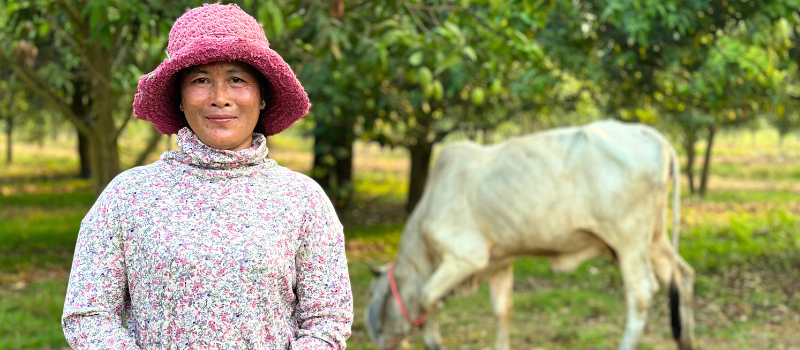 🔗 Download the
🔗 Download the 


